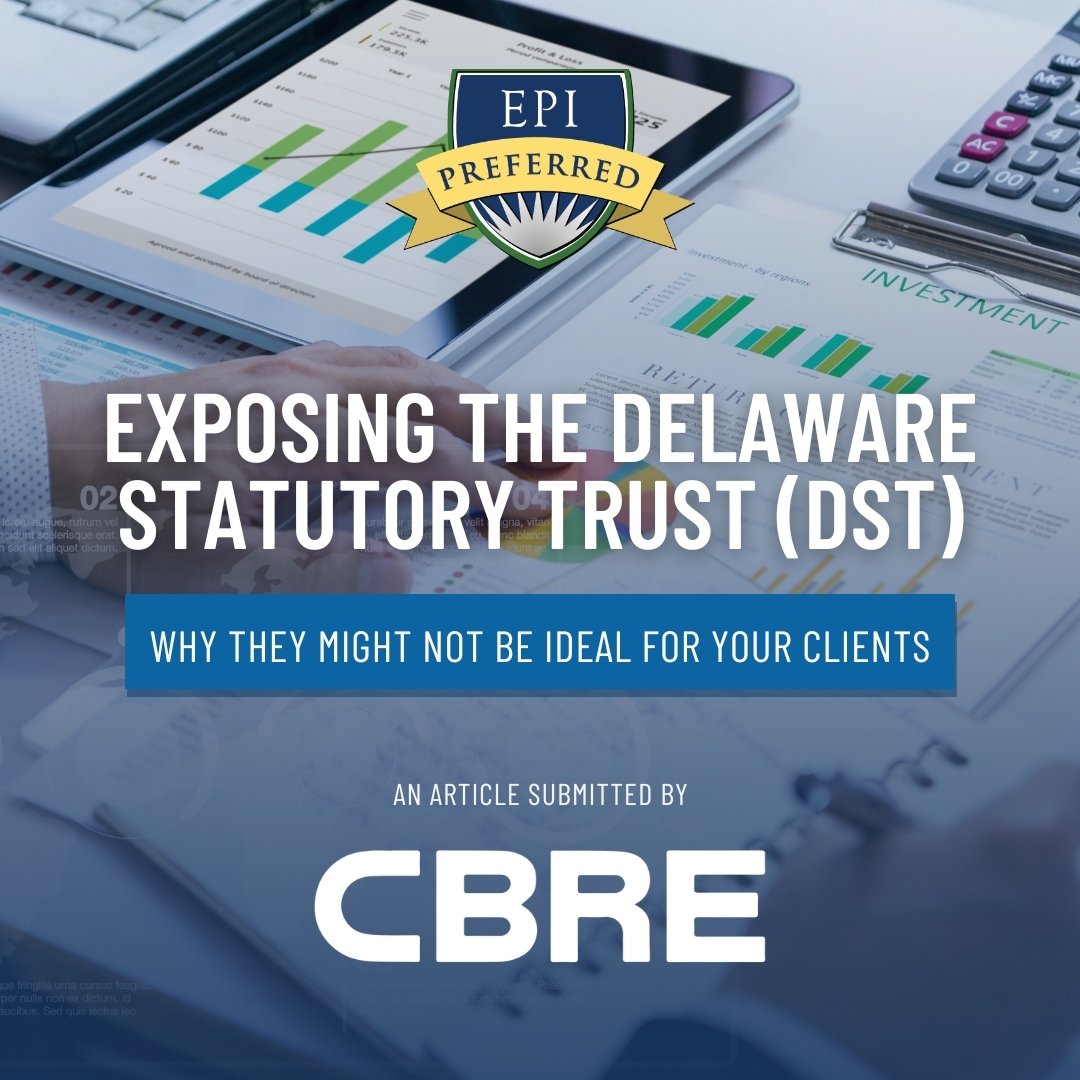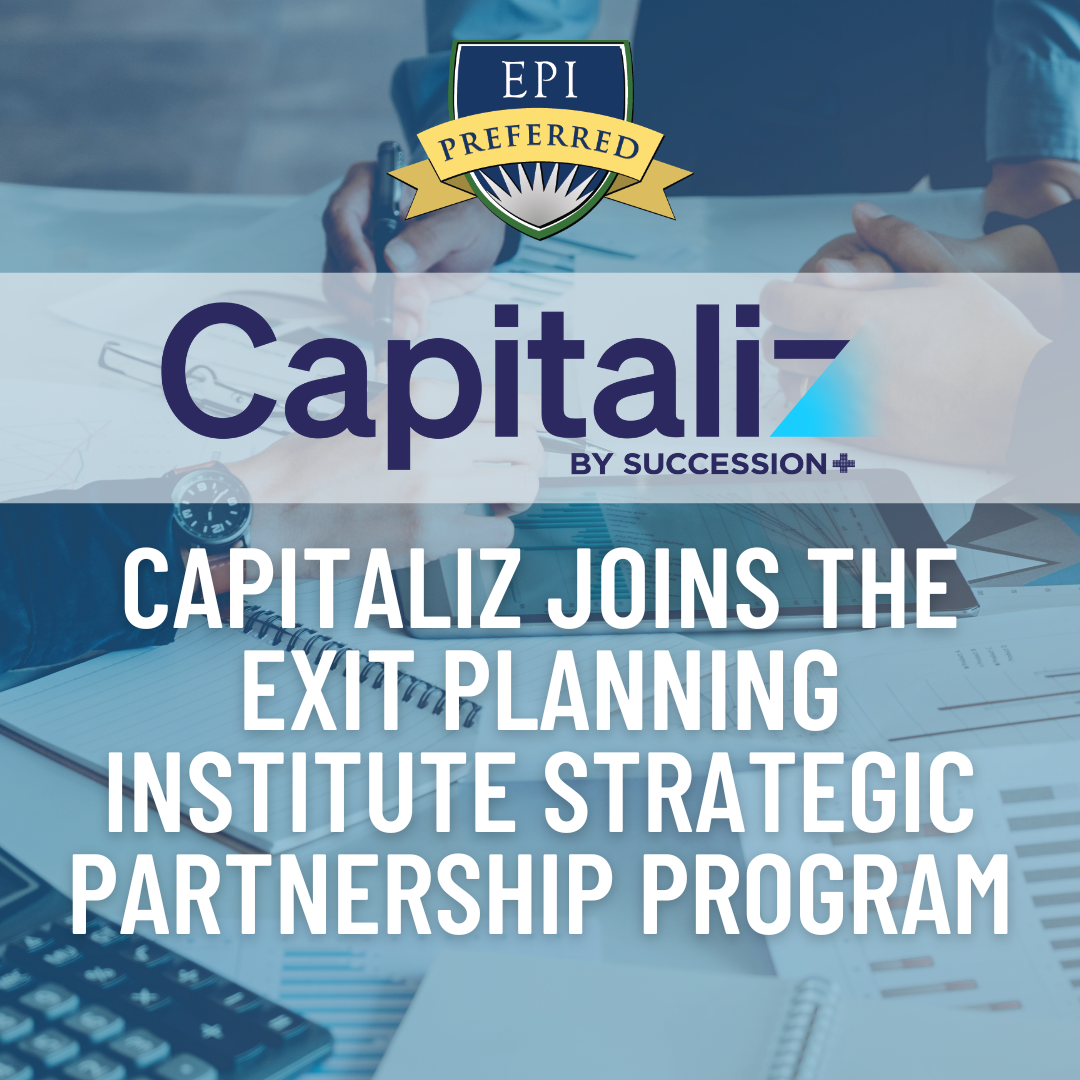
THE EXIT PLANNING BLOG
Keep up-to-date with exit planning, succession planning, industry trends, unique specialty insights, and useful content for professional advisors and business owners.
Share this
Exposing The Delaware Statutory Trust (DST): Why They Might Not Be Ideal For Your Clients
by Partner Contributed Article on April 4, 2024

Delaware Statutory Trusts (DSTs) have long been touted as a convenient and tax-efficient way to invest in real estate. Yet, beneath the veneer of tax advantages lies a complex web of risks and drawbacks that often go overlooked by investors and financial advisors alike. In this article, we'll shine a light on the inherent pitfalls of DSTs, from their inferiority compared to direct real estate ownership to the commonly overlooked factors that can spell trouble for investors.
The Downsides of DSTs: Why They Fall Short
When it comes to investing in real estate, DSTs may seem like an attractive option at first glance. However, upon closer inspection, it becomes clear that these structures come with significant drawbacks that may outweigh any potential tax benefits.
Lack of Control and Liquidity: Unlike direct ownership of real estate, where investors have control over property management decisions, DST investors have little to no say in how their investment properties are managed. This lack of control can be concerning, particularly in situations where investors wish to make strategic changes or respond to market dynamics. Additionally, DSTs lack liquidity, meaning that there is no secondary market for investors to sell their shares if the need arises.
Long-Term Commitment and Liability Risks: Investing in a DST often requires a long-term commitment, with most trusts holding properties for 5 to 10 years. This lack of liquidity can pose challenges for investors who may need access to their funds in the short term. Furthermore, investors may find themselves liable for unexpected expenses if the DST sponsor is unable to cover additional capital calls, exposing them to unnecessary financial risks.
High Fees and Inferior Properties: Another significant drawback of DSTs are the high fees associated with them, including acquisition, disposition, and management fees. These fees can eat into investors' returns and diminish the overall profitability of the investment. Moreover, DST properties are often inferior in quality compared to direct real estate ownership, with sponsors sometimes underwriting properties poorly, leading to suboptimal investment outcomes.
While DSTs may appear to offer a passive approach to owning commercial real estate with tax advantages, the risks they entail far outweigh the perceived benefits. Investors are better served by maintaining direct ownership of real estate, where they have greater control over their long-term financial well-being. By owning real estate directly, investors can still take a hands-off approach by employing a property manager while retaining the ability to make strategic decisions and respond to market dynamics. It's essential for investors and financial advisors to recognize the importance of maintaining control and actively managing their investments to ensure optimal outcomes and long-term financial success.
Overlooked Factors in DST Analysis: What Investors Miss
Amidst the allure of a "hands-off" investment approach, investors often overlook critical factors when analyzing DST deals, leading to potentially detrimental consequences down the road. It's easy to be drawn in by the promise of passive income and tax advantages, but the reality is that investors may be blindsided by the complexities and risks associated with DSTs. Let's delve into the factors commonly overlooked by investors, highlighting why a deeper analysis is imperative for informed decision-making:
Estate Planning Considerations: Investors frequently fail to recognize the significant estate planning implications of investing in DSTs. From tax liabilities to inheritance issues, the structure of DST ownership can have far-reaching effects on an investor's estate. Without careful consideration of these factors, investors may inadvertently expose themselves and their heirs to unnecessary financial burdens.
Property Metrics and Market Analysis: Metrics such as cap rates, after-tax cash flow, and lease terms are crucial indicators of a property's performance and viability. Yet, in the rush to embrace the passive nature of DST investments, investors often neglect to conduct thorough market analyses. Failure to assess factors such as property location, demographic trends, and competition within the market can lead to misinformed investment decisions and subpar returns.
Potential Upside and Appreciation: While DSTs are marketed as stable, income-generating investments, investors may overlook the potential for upside and appreciation. By focusing solely on immediate cash flow and tax benefits, investors may miss out on opportunities for long-term growth and wealth accumulation. A deeper analysis of market trends, property dynamics, and growth projections is essential to uncovering the true potential of DST investments.
Risk Profile and Long-Term Goals: Every investor has a unique risk profile and set of long-term goals, yet these factors are often overlooked in the rush to embrace DSTs. Without a thorough assessment of risk tolerance and investment objectives, investors may find themselves exposed to undue risks or locked into investments that do not align with their financial aspirations. It's essential for investors to carefully consider their individual circumstances and objectives before committing to DST investments.
Active Management vs. Passive Ownership: DSTs are marketed as a passive approach to owning commercial real estate, but investors may fail to recognize the benefits of active management and direct ownership. By maintaining control over their investments and actively managing their properties, investors retain the flexibility to make strategic decisions, respond to market dynamics, and maximize returns. While DSTs offer a seemingly hands-off approach, investors may ultimately be better served by maintaining a small degree of involvement in their real estate investments.
In conclusion, while the "hands-off" nature of DST investments may seem appealing, investors must not overlook the critical factors that must be analyzed to ensure investment success. By conducting thorough due diligence and considering all aspects of the investment, investors can make informed decisions that align with their long-term financial goals and mitigate unnecessary risks. It's essential to look beyond the marketing hype and delve into the complexities of DST investments to uncover the true opportunities and pitfalls they present.
Meet The Author
 Chris Martin is a Senior Vice President with CBRE Capital Markets, Investment Properties, based in Newport Beach, California. Chris co-heads CBRE’s Buyer Advisory Services Group which represents 1031 exchange buyers in acquiring retail, industrial, multi-family and office replacement properties across the United States.
Chris Martin is a Senior Vice President with CBRE Capital Markets, Investment Properties, based in Newport Beach, California. Chris co-heads CBRE’s Buyer Advisory Services Group which represents 1031 exchange buyers in acquiring retail, industrial, multi-family and office replacement properties across the United States.
The team is widely considered to be one of the premier investment sales brokerage teams in the country. Since 2018, the team has been involved in over $3 Billion of investment transactions and has consistently ranked in the top 5 teams nationally out of 92 teams over the last 15 years.
Prior to joining CBRE, Chris attended the University of Arizona where he graduated with a degree in Finance from the Eller School of management.
Share this
- Blog (548)
- CEPA (431)
- exit planning (249)
- CEPA community (188)
- Business Owner (175)
- Exit Planning Summit (99)
- EPI Chapter Network (89)
- Value Acceleration Methodology (81)
- Exit Planning Partner Network (76)
- EPI Announcement (50)
- Content (48)
- Webinars (37)
- Excellence in Exit Planning Awards (34)
- Marketing (30)
- 2024 Exit Planning Summit (28)
- 5 Stages of Value Maturity (26)
- Books (24)
- EPI Academy (24)
- EPI Team (22)
- Exit Planning Teams (22)
- Leadership (21)
- 2023 Exit Planning Summit (20)
- family business (20)
- women in business (19)
- Intangible Capital (18)
- Exit Options (17)
- Black Friday (16)
- CPA (15)
- Walking to Destiny (15)
- Chapters (14)
- State of Owner Readiness (14)
- charitable intent (13)
- Chris Snider (12)
- National Accounts (12)
- Small business (12)
- personal planning (12)
- Financial Advisors (11)
- Season of Deals (9)
- 5 Ds (8)
- About us (8)
- Podcast (8)
- Scott Snider (8)
- Insiders Bash (7)
- Christmas (6)
- Exit Planning Content Library (6)
- Case Studies (5)
- Owner Roundtables (5)
- Three Legs of the Stool (5)
- Value Advisors (5)
- financial planning (5)
- Awards (4)
- Circle of Excellence (4)
- EPI Thought Leadership Council (4)
- Exit & Succession (4)
- Five Ds (4)
- executive training (4)
- DriveValue (3)
- Owners Forum (3)
- author (3)
- forbes (3)
- Exit Is Now Podcast (2)
- Peter Christman (2)
- Veteran (2)
- Whitepapers (2)
- Annual Exit (1)
- Business Owners Forum (1)
- SOOR (1)
- business consultants (1)







